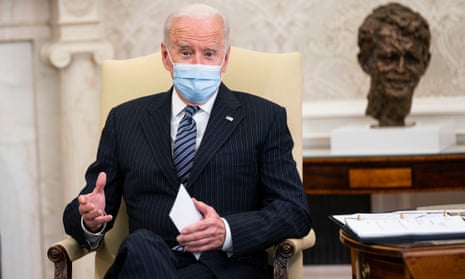The differences couldn’t be more stark. Promises to “build back better” from Covid-19 have been made on both sides of the Atlantic. But as lockdown measures are steadily relaxed, President Joe Biden is showing far greater ambition than Boris Johnson’s government when it comes to shaping the post-pandemic recovery.
This week, Washington will set out plans for the most comprehensive reforms of American tax policy in half a century, alongside trillions of dollars in funding for investment to tackle deep-rooted inequalities.
In a measure that is expected to reverse years of tax cuts that have benefited the wealthiest in society, tax on investment gains will be almost doubled, from 20% to 39.6%, for Americans with earnings of $1m or more. A 3.8% tax on investment income used to fund Obamacare will also be retained, which takes the US’s top rate as high as 43.4%.
Biden is also preparing to raise the top marginal income tax rate to 39.6% from 37% as a way of bringing parity between taxation of returns from wealth and from work.
There are two important issues to consider. First, whether the most ambitious version of Biden’s plan will pass through a divided Congress. The president will require unanimous Democrat support, given expected fierce opposition from Republicans. Second, there are concerns about inflation, as the stimulus plan turbocharges US growth.
However, the risks from lasting damage for the poorest in society, as well as the need to tackle inequalities in the US dating from long before Covid, mean a sweeping package of stimulus measures and structural tax reforms are the only way the “build back better” pledge will mean anything more than a political soundbite.
In contrast, the measures outlined by the chancellor, Rishi Sunak, at last month’s budget are positively timid. Rather than rekindle the spirit of economic reform that followed the second world war, as in the US, Britain gets freeports and a furlough extension until the autumn.
The government has toyed with ideas similar to Biden’s but hasn’t come anywhere close to following through. Last year, the Office for Tax Simplification recommended raising capital gains tax to bring it into line with income tax, after a review commissioned by Sunak. It was a finding welcomed by progressives, who had for years been calling for the government to take steps of this kind to tackle inequality.
The IPPR thinktank estimates that this measure could raise £90bn of additional revenue over five years – after taking account of the behavioural changes many wealthy individuals will make to avoid the full impact of the tax increase. Given the urgent need to tackle inequality, and that the government borrowed £303bn last year – more than in any year since 1946 – it is a compelling idea.
The share of national income paid out in wages, salaries and benefits has been in steady decline for decades in both the US and the UK, while returns on capital – investment returns – have been steadily increasing.
With capital gains tax set at a lower rate than income tax, this disparity has only been worsened by the tax system. Reforms designed to rebalance the system would go a long way towards addressing this iniquity. Yet the chancellor took no such action at the budget.
There are hopes among progressives that Biden’s tax audacity could help Britain to take further action – not least because it would put pressure on the government to follow the lead of the world’s biggest economic superpower.
There has been an early glimpse of how this would work. At the budget, Sunak raised corporation tax, arguing that he was able to maintain a competitive rate because the Biden administration was also raising taxes on company profits.
The shift to a more radical economic policy in Washington opens up space for the government in London to take similar actions. To fulfil his promises to build back better, Johnson need only look across the Atlantic for inspiration.
The force is still strong with Netflix

‘It’s just a little wobbly right now,” said Netflix founder Reed Hastings last week, understating the share sell-off caused by a dramatic slump in new subscribers that wiped $20bn from the market value of the world’s biggest streaming service.
Netflix added just under 4 million new subscribers in the first three months, a quarter of those it signed up in the same period last year and 2 million fewer than it had predicted. The pandemic home entertainment boom had fuelled the company’s best year ever, but with a forecast of just a million new subscribers this quarter – the lowest level in more than a decade – has the world passed “peak Netflix”?
First-mover advantage made Netflix a 200-million-subscriber juggernaut. But deep-pocketed rivals have emerged, including Disney+, which has raced to more than 100 million subscribers in just 16 months, and Amazon Prime, with more than 150 million users. Many of these new players provided Netflix’s most popular content, from Friends to Marvel films, and now funnel these to their own services.
Netflix is now looking for new sources of revenue, such as a crackdown on password sharing. Analysts estimate that more than 30 million households “borrow” log-in details, losing the company $6bn a year.
Hastings hopes consumer products related to its hit content – Disney makes billions from selling Frozen and Star Wars merchandise – will contribute to a “gigantic, hopefully defensible profit pool”.
But Netflix has never been in a stronger financial position. It can fund its content spending without turning to debt markets, operating margins are at an all-time high, and investors are seeing the first stock buyback in more than 15 years. The first two quarters will be disappointing for growth, but Netflix is fit to do battle in the next era of the global streaming wars.
JP Morgan needs to reflect on Super League gaffes

‘We clearly misjudged how this deal would be viewed by the wider football community and how it might impact them in the future. We will learn from this,” said JP Morgan on Friday, finally acknowledging its spectacular own goal in its role of would-be financier of the 48-hour fiasco that was the European Super League.
If lessons are what chief executive Jamie Dimon seeks, here’s one: stop boasting that JP Morgan is on a mission to improve the lot of “communities” – he used the word tirelessly in this month’s annual letter to shareholders. It’ll be half a decade, minimum, before Europeans are ready to hear another round of such self-congratulatory drivel.
That the Super League would enrage football fans across Europe should have been obvious from the day the project was conceived. The idea of a closed-shop competition of elite clubs flies in the face of 100-plus years of sporting history. The only motivating force was the clubs’ desperation to escape their debts by boosting their broadcasting revenues.
We don’t know how closely JP Morgan’s “public responsibility committee” – the body charged with looking out for issues that could damage the firm’s reputation – scrutinised the Super League proposal. But somebody senior must have been aware that the provision of a €3.25bn (£2.8bn) loan was the only thing giving the shambolic venture any credibility. Yet JP Morgan ploughed on. If it took political soundings, it didn’t draw the right conclusion – that the adventure wouldn’t fly. No European bank, one suspects, would have gone near the Super League proposal.
The oligarch and billionaire owners of the football clubs are ultimately to blame, of course, but JP Morgan emerges as clumsy at best, or simply living in a bubble. A long period of silence from Dimon on the subject of serving communities is now in order.
